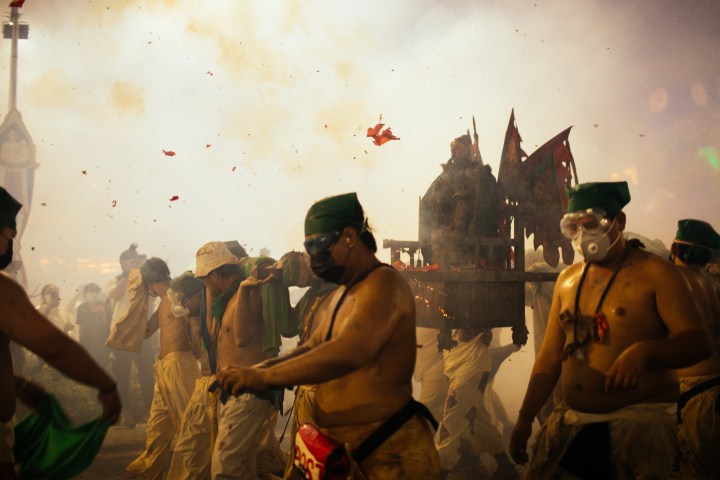[Warning: This article contains pictures with blood and gore.]
Two men walk along with a rubber hose connecting them that’s pierced through their cheeks. Other men slice their tongues to a bloody mess with a ceremonial hatchet. Another man’s shirt is burnt to shreds by firecrackers. Despite these acts gory and dangerous air, they’re all about gaining blessings from the gods to keep away bad luck and tragedy. It’s the annual Phuket Vegetarian Festival, a nine-day affair that’s been happening for 150 years.


Chiang Mai photographer Krerkburin Kerngburi has seen pictures of the festival in the newspaper since he was a kid and was always fascinated by it, and this year he finally made it to the island to capture it in all its wild glory. “I had so many questions, it just looks so surreal,” he says. “So I jumped at the chance to go this year now that COVID restrictions are finally over.” His original goal was to shoot them for his SurrealLand! series, which is about the irony of Thai belief systems and social vulnerability to superstition. But he found it very spiritual and wants to return next year in order to learn more about it on a deeper level and better understand the devotees’ beliefs.


The festival, also called The Nine Emperor Gods Festival, is a Taoist event celebrated by the ethnic-Chinese community to honor the nine sons of the Big Dipper goddess Dou Mu. Local legend says that the town was ravaged by disease in ancient times. A traveling Chinese opera troupe fell ill but then followed a strict set of rules to cleanse themselves and bring good health and peace of mind. They refrained from using animal products, avoided sex and alcohol, and engaged in other virtuous practices to invoke the gods. They miraculously recovered from the disease, and the whole community has followed these rules every year since then.



The same festival is still celebrated in China, but the body mutilations are believed to come from the Tamil-Hindu Thaipusam festival. The ones who mutilate themselves are called ma song—spirit mediums who allow the gods to possess them. They believe that the gods remove the sensation of pain and that by engaging in these acts they take evil spirits away from the community and bring good luck to the people for the rest of the year. Once they believe they’re possessed, they visit a shrine to be vetted. While everyone else wears white, the mediums wear costumes resembling a butcher’s apron covered with colorful Chinese-style designs. In addition to the piercing and cutting, the mediums also bathe in hot oil, walk over hot coals, and climb ladders made of blades.


The piercings happen at the shrines in the early morning and are performed without anesthetics because they enter a trance-like state from the gods who possess them. They wear gloves and sanitize the materials, and the Department of Disease Control requires them to check for blood diseases and report it if they test positive for anything.


The festival gets bigger and wilder with each season, but some are uncomfortable with what it’s become. Some temple leaders think younger mediums are showing off in a materialistic competition and health officials, who have medics on hand, urge devotees not to get gruesome piercings. They definitely leave scars. But clearly, no one is stopping.


On the last night, the parade turns into a blaze of light, smoke, and explosions as the whole city lights firecrackers as a send-off for the gods. “It was hard to breathe, I had to wear a mask,” Kerngburi laughs. “You can’t see anything. One blew up right in front of me, all I could see was this blast right in my eyes!” The excitement of the finale leaves everyone wanting more.








